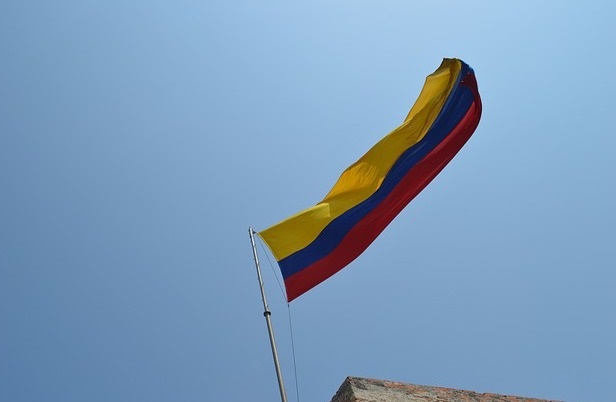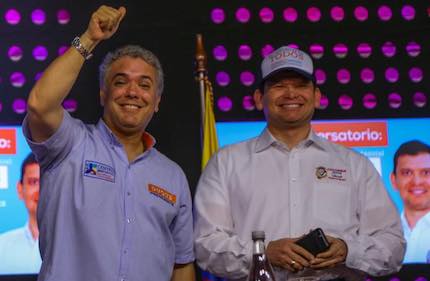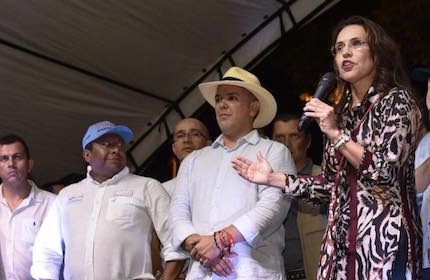The evangelical vote appeared to be largely with Viviane Morales, but her resignation from the presidential campaign has generated division. The two favourites, Iván Duque and Gustavo Petro, will fight it out for victory in the second round.
 The flag of Colombia. / Pixabay (CC0)
The flag of Colombia. / Pixabay (CC0)
Polarisation, deals that seemed impossible, fake news, fraud accusations... These are all factors that have featured in the news prior to most elections in the last two years in almost the entire developed world. In Colombia’s case - which went to the polls on Sunday 27th May - there is no exception.
The long and intense electoral campaign concluded with two favourites: firstly, Iván Duque, the candidate from the Democratic Centre, who won 39% of the vote in the first round. Gustavo Petro, from Colombia Humana, will face him again after following with 25% of the vote.
The first candidate, from the same party as former President Álvaro Uribe, presents a conservative manifesto; the second, the former mayor of Bogotá, brings to the table a more socialist-oriented manifesto.
THE EVANGELICAL VOTE
In perhaps no other recent presidential campaign have evangelicals had such a prominent presence in media and politics. A large part of this public exposure is down to Vivane Morales and her particular journey through the campaign. Her resignation halfway through her own candidacy has provoked a great mass of comments and assessments, including from pastors, churches and other Christian entities.
It has been widely recognised that after the unexpected result of the 2016 referendum, the “evangelical factor” is something that needs to be considered, and it deserves more study and attention as much by the media as by the parties and society in general.
 Candidate Ivan Duque and the leader of the Christian party Colombia Justa Libres, Jhon Milton. / Colombia Justa Libres Facebook
Candidate Ivan Duque and the leader of the Christian party Colombia Justa Libres, Jhon Milton. / Colombia Justa Libres Facebook“The evangelical Christian vote will be decisive in the next presidential election”, explains the pastor Héctor Pardo, one of the key evangelicals in the development of peace negotiations with the FARC.
Pardo believes that in this campaign, “everyone has been going after the evangelicals, but the vast majority of them are leaning towards the candidate Iván Duque; he’s the one that has promised to promote Judeo-Christian thought”.
Ronald Rodriguez, a widely experienced evangelical journalist established in Cartagena de Indias, agrees that there is a general interest to capture the “Christian vote” (in Colombia, evangelicals are popularly known as “Christians”).
“Viviane Morales and her group went to support Iván Duque (Democratic Centre), but Germán Vargas Lleras (Mejor Vargas Lleras, or “Best Vargas Lleras”), has also had backing from evangelical Christians. The mega-churches are seen as gold for the majority of candidates that win their votes, not believers”, reflects the journalist.
PASTORS MARKING PROPOSALS
Lope Trujillo, pastor and Colombian political analyst, brings up something more dubious about the power of the evangelical turnout to determine the vote one way or another. “The elections on the 11th March showed the true size of the 'Christian vote’ in Colombia: 2.7% of the entire electorate. But even if this percentage is insufficient to define the presidential elections, it has allowed the coalition ‘Colombia Justa Libres’ to put 3 senators and a representative in the chamber. When Viviane Morales was still in the running, she maintained a margin very similar to that 2.7%”, explains Trujillo.
What Trujillo has perceived is an interest in closing the gap between conservative moral principles and evangelical standards. “It’s no coincidence”, he suggests, the “similarity” that exists between the manifesto of the Democratic Centre “and the proposals of the political leaders of the Christian Church. From the beginning, one could see that they were coming from the same textual base”.
“It is a change that reveals a previous agreement between the party leading the polls and the political Christian movement. Before 2002, this political strength in a movement led by pastors was unthinkable”, Trujillo affirms.
THE DOUBTS SURROUNDING VIVIANE MORALES
One of the factors that complicates the worth of the Christian vote has to do with the resignation of Viviane Morales from her electoral campaign. The candidate, supported by ‘Colombia Justa Libres’ resigned from her candidacy to join Iván Duque’s campaign. And after a few days of uncertainty, the Christian party also announced that it recommended voting for the Democratic Centre candidate.
“Viviane Morales disappointed a lot of evangelical Christians”, Héctor Pardo recognises. The lawyer and seasoned politician “has received a lot of criticism after joining Iván Duque to propel his candidacy”, which has divided a vote that felt very much united around her before her resignation.
 Viviane Morales had been able to unite all evangelical Christians behind her candidacy. / V. Morales Facebook
Viviane Morales had been able to unite all evangelical Christians behind her candidacy. / V. Morales FacebookJournalist Ronald Rodríguez sees it much the same way. “She had achieved something that was very difficult to do: she had united the Colombian evangelical people behind one person who was intellectually capable and spiritually convincing”. But “all of that broke down” after abandoning her candidacy, the journalist expresses. “The Christian vote was left orphaned of a candidate that was 100% Christian, and so voters were left to search for ‘substitute homes’, while others preferred to wander the streets”.
For the pastor and analyst Lope Trujillo, there were two very different stages: “Viviane Morales’ pre-campaign had a very constitutional, inclusive glamour about it. She always maintained her position of stateswoman, which attracted both Catholics and Protestants alike”.
However, upon starting her campaign, “she began over-spiritualising her speeches, to the point where her slogan was ‘the hour of faith has arrived’. That is why she created expectations that had a prophetic feel about them, which ultimately ended up defrauding the supporters that were hoping for a supernatural triumph, like that of Gideon. “This”, believes Trujillo, “shows that the Christian electoral base still sees politics as an extension of a ‘spiritual war’”.
MORE FEARS THAN HOPES
Beyond the situation with the evangelicals, the whole country is facing a decisive moment with the difficult challenge of developing peace treaties, the socioeconomic state of the country, the delicate issue of the border with Venezuela, and the differing models of education and familial organisation that characterise the political debate in Latin America these days.
 Petro, the left-wing candidate.
Petro, the left-wing candidate. For the pastor Héctor Pardo, this electoral process has immense importance. “We are facing the decision over whether to accept a new ideology: the socialism of the 21st century, which is based on Marxist-Leninist Hegelian ideology, and would therefore put a stop to the influence of Judeo-Christian ideology”, believes the pastor, in reference to the candidate Gustavo Petro.
The political analyst Lope Trujillo believes that the elections have been marked by global tendencies: he mentions “post-truth” as a tool used by some to win votes. In his opinion, “the gender issue” has been overemphasised, and electoral dynamics “have centred themselves on constructing threatening narratives that pile citizens into an irrational horde moved by fear rather than a desire to build a better country”.
Ronald Rodríguez agrees in his analysis: “on the one hand, they have sold the idea that if a guerrilla war veteran were to win, the country would become a second Venezuela. They also assure that another two of the candidates, if elected, would destroy the peace treaties signed between the government and the FARC. But at the same time, the winds of corruption would blow stronger still if a political despot took over on the 7th August, as the unions predict. And as if that were not enough, it also seems a given that a former President would govern from a foreign body.
The journalist reckons there is an atmosphere of pessimism, marked by “the dirty war of fake news and attacks via social media” that have characterised the campaign, rather than allowing “a true debate of ideas and proposals”. And although Rodríguez speaks of Colombia, it wouldn’t be so hard to put in the name of any other country that has lived through an electoral process in these confusing times.

Las opiniones vertidas por nuestros colaboradores se realizan a nivel personal, pudiendo coincidir o no con la postura de la dirección de Protestante Digital.
Si quieres comentar o